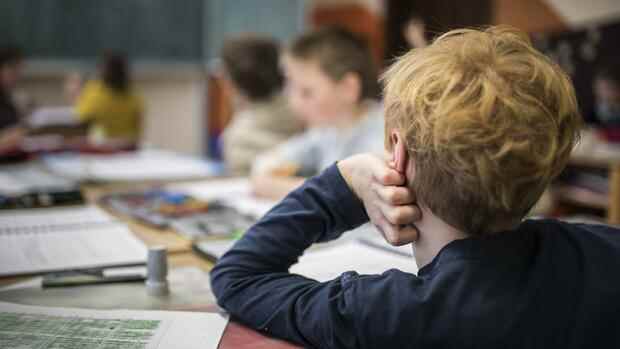Other federal states also fear that the rapidly increasing number of cases will mean that so many school staff will be absent that regular lessons can no longer take place.
Nevertheless, the schools should remain open as long as possible – the ministers of education formulated this appeal last week. After all, the pandemic “doesn’t start there,” said KMK President Karin Prien (CDU) in an interview with Handelsblatt. The Federal Minister of Education made a similar statement. Criticism of this attitude comes from teacher president Heinz-Peter Meidinger: It is “not appropriate to downplay existing dangers”, he told the Handelsblatt.
Top jobs of the day
Find the best jobs now and
be notified by email.
Meidinger refers, among other things, to the Robert Koch Institute (RKI), which had already called for longer holidays before Christmas. Then it must be checked “whether face-to-face lessons or distance, hybrid or alternating lessons can take place”, demanded RKI boss Lothar Wieler.
“Unscientific Statements”
The repeated assertion by the education ministers that schools are not pandemic drivers is unscientific, criticizes Meidinger. It is also noticeable that this is repeated over and over – regardless of the infection rate in the younger population.
In spring 2020, the age-specific incidences in children were half as high as in the general population, but in December of last year it was two to three times as high. The general seven-day incidence today is 388 – that for five- to 14-year-olds is 508.
The fact that a large number of adults are vaccinated and a large number of children remain unvaccinated is also ignored.
RKI: the role of schools is “controversial”
In an analysis at the beginning of January, the RKI also confirmed that the schools did not play a below-average role in the pandemic. The institute examined a total of 7165 cases of infection among schoolchildren in Hamburg between August 2020 and the beginning of October 2021. The result is ambiguous and contradicting, the meaning of the schools is simply “controversial”, the RKI experts admit.
Because they could not take into account, for example, that the schools were completely or partially closed for several months. However, there are no indications of “a particularly high level of participation by Hamburg schools in the infection process”. The bottom line is that the schools are “not an infection hotspot”, but “they do play a relevant role in the infection process”. However, it is “undisputed” that regular school operation in attendance also increases general mobility and the frequency of contact, “which increases the risk of infections”.
The head of virology at the Berlin Charité, Christian Drosten, sees the intervention in the school operation “the strongest measure” against the pandemic. “Before Christmas, we had a dominance of schools in the Delta wave, and we saw very clearly that this is also passed on from schools to the adult classes,” he said on the NDR podcast. “So this is the one mechanism that can prevent a certain origin of infections there.”
The epidemiologist Markus Scholz from the University of Leipzig therefore considers it likely that – if the schools remain open – children and teachers could be even more stressed during the Omikron wave than under the Delta variant. “The rapid tests work less well with Omikron, and the infection just happens too quickly,” Scholz told the Handelsblatt. “The vaccination rate among young people is far too low, especially in the eastern federal states.” And there was still a lack of air filters in many schools.
More and more children are being hospitalized in the United States and France
In the USA and France there is already a sharp increase in hospital cases in children and adolescents due to Omikron. “I cannot see that health protection for schoolchildren and their relatives is particularly important in Germany,” said Scholz. “One is de facto relying on natural contamination without exactly knowing the long-term consequences.”
Timo Ulrichs, epidemiologist at the Chair of Global Health at the Akkon University in Berlin, on the other hand, says that the Omikron variant is so contagious that the question of who is driving the pandemic still has to be assessed. “Certainly, if there is a certain pressure of infection, the schools contribute more to the spread, but with good hygiene concepts they can also be well protected against an onset of the virus,” Ulrichs told Handelsblatt. “And that is what we should focus on first, that is, make everything around the schools safe, and that is especially possible with measures for adults.”
The teacher president also advocates making flexible adjustments to the increasing number of infections: with qualified mask requirements, daily tests, suspension of mandatory attendance, low-threshold vaccination campaigns in the vicinity of schools or the restoration of the minimum distance. “In any case, accepting an unhindered contamination of schools like in Great Britain is not a serious option for me,” he said.
Meidinger reports on two groups of parents. “One group is not very worried about their children and basically has nothing against a disease concept,” he said. “The much larger group is, however, worried and is definitely in favor of upholding or even strengthening protective measures in the face of Omikron.”
More: Omikron is also putting the rapid test system to the test – the start of school becomes a test marathon
